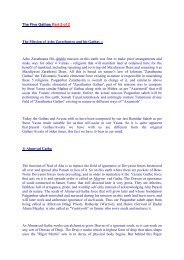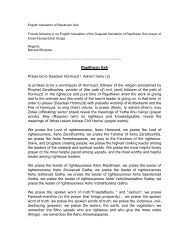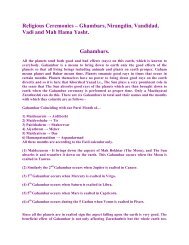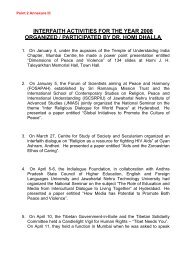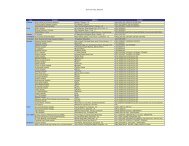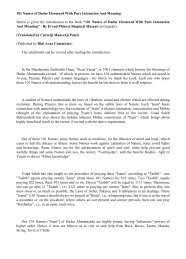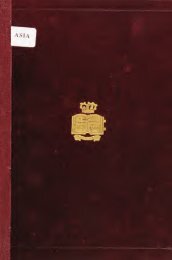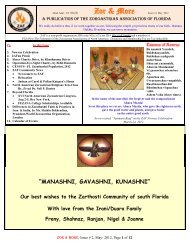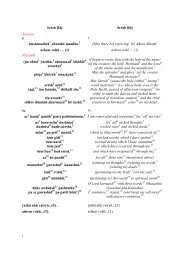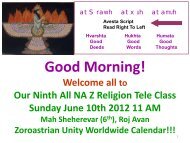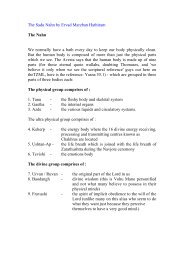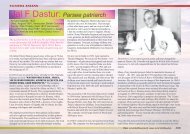Tata Consultancy Services
Tata Consultancy Services
Tata Consultancy Services
Create successful ePaper yourself
Turn your PDF publications into a flip-book with our unique Google optimized e-Paper software.
About this article<br />
<strong>Tata</strong> <strong>Consultancy</strong> <strong>Services</strong><br />
Inheritance of Management Philosophy<br />
(Viewpoint of a Management Anthropologist)<br />
Dr. Noriya Sumihara<br />
(Rendered from the Japanese)<br />
This article appeared in the PHP Business Review (May-June 2011), a bimonthly business<br />
magazine published from Japan. Peace and Happiness through Prosperity (PHP) is a<br />
Foundation established through the personal assets of Mr. Konosuke Matsushita, the founder of<br />
Panasonic.<br />
Author Profile<br />
Dr. Noriya Sumihara (male) is a Business (Corporate) Anthropologist and Professor at the<br />
International Centre for Regional Studies, Tenri University, Nara, Japan. He obtained his<br />
Doctorate (1992) and MA degree (1984) from the New York University, USA. He completed his<br />
Bachelor’s degree (1981) from Kobe University, Japan.<br />
1
Inheritance of Management Philosophy<br />
(Viewpoint of a Management Anthropologist)<br />
No. 15<br />
<strong>Tata</strong> <strong>Consultancy</strong> <strong>Services</strong> (TCS)<br />
Part II<br />
Dr. Noriya Sumihara<br />
Professor at the International Centre for Regional Studies, Tenri University, Nara,<br />
Japan<br />
I (Left), Mr. F.C. Kohli, Professor Izumi Mitsui (Nihon University), Associate Professor<br />
Masayo Fujimoto (Doshisha University)<br />
―Using IT for the industrial revolution of modern India‖<br />
----- Philosophy and Inheritance as models of ―Comprehensive<br />
Rationalism‖<br />
<strong>Tata</strong> <strong>Consultancy</strong> <strong>Services</strong> (TCS) was launched in Mumbai, with a staff strength of less<br />
than 10 persons, as the first Indian IT company in 1968. Currently, it has<br />
approximately 180,000 IT consultants in more than 250 locations across 53 countries in<br />
5 continents and a gross income of US Dollars 6.3 billion in the financial year ended on<br />
March 31, 2010. TCS is not only the largest in Asia, but a gigantic global IT company,<br />
which has entered the Global Top 10.<br />
Air India Building (Mumbai), the headquarters<br />
of TCS in the initial years of its establishment.<br />
2
Since TCS does not deal much in hardware and its products are software and services,<br />
which are intangible, it is difficult for the general consumer to see it; but its business,<br />
management policy, the current status of the living management principles, which form<br />
its background, are worth noting. In particular, the vision of Mr. F.C. Kohli<br />
(1924~)--who nurtured TCS from the time it was founded and is also known as the<br />
Father of Indian IT--is internationally noteworthy as a philosophy that went well<br />
beyond a general company‘s objectives. Mr. Kohli was praised for that achievement and<br />
received several awards, including the third most prestigious award, the Padma<br />
Bhushan, which was conferred upon him by the Government of India.<br />
The <strong>Tata</strong> Group, the parent organization of TCS is India‘s largest conglomerate. At<br />
present, the Group—with major operations in seven types of industries such as steel,<br />
power, automobiles, etc--has approximately 100 companies and 400,000 employees in 80<br />
countries across the globe. It is a mammoth global enterprise, with a revenue of<br />
approximately US Dollars 71 billion for the year 2008~2009. (Of this, approximately<br />
65% was obtained from countries outside India.)<br />
The <strong>Tata</strong> Group was founded in 1868, the first year of the Meiji Era in Japanese history.<br />
It is a conglomerate that represents India. Right from the time of its founder, Jamshetji<br />
<strong>Tata</strong> (1839~1904), the industrialist who earned his place in history, to the present 5 th<br />
generation Chairman Mr. Ratan <strong>Tata</strong> (1937~), the Group has always continued to have<br />
high ethical standards. The <strong>Tata</strong> Group has generously contributed to the development<br />
of the Indian nation and society at large. Regardless of the environment, be it the long<br />
colonial rule up to 1947, or the extremely restricted economic environment--the planned<br />
and controlled socialist economy (1951~1991) propagated soon after independence--or<br />
the era of cut-throat global competition following economic liberalization (1991~) up to<br />
the present, the Group has been a catalyst for socio-economic change in the country. It is<br />
even called ―India‘s pride‖. In the latter part of this article, I would like to look at how<br />
the <strong>Tata</strong> Group is growing as a cohesive global enterprise under the guidance of the<br />
present Chairman, Mr. Ratan <strong>Tata</strong>, while sustaining and growing the basic tenets it has<br />
inherited from its founders.<br />
From the <strong>Tata</strong> Group‘s four main pillar industries (steel, power, automobiles,<br />
information industry--IT), this article focuses on <strong>Tata</strong> <strong>Consultancy</strong> <strong>Services</strong> Limited<br />
(TCS), the IT company that has shown a remarkable growth in its 40+ years of existence.<br />
TCS is not just a large enterprise, but a pioneer that has developed India into one of the<br />
greatest IT powers in the world along with America.<br />
3
I had the opportunity to interview and listen to the ideas of some of the key persons in<br />
TCS at the beginning of this year. This article is a compilation of the interviews, which I<br />
conducted during my three visits to India, as well as the culmination of the research of<br />
the information available in English and Japanese.<br />
Profile N Chandrasekaran<br />
Born in 1963. Did his Bachelor’s Degree from Coimbatore Institute of<br />
Technology and Master’s from Regional Engineering College. Joined<br />
TCS in 1987. Appointed as CEO in 2009 (One of the youngest CEOs<br />
in the <strong>Tata</strong> Group). Chosen as India’s Best CEO in 2010 by Finance<br />
Asia Magazine.<br />
Profile S. Ramadorai<br />
Born in Nagpur, India in 1944. Did his Master’s in UCLA<br />
after passing out from Delhi University and IISc. Joined<br />
TCS in 1972. Appointed as TCS America GM in 1979,<br />
CEO in 1996 and is currently Vice Chairman since 2009.<br />
Received Padma Bhushan Award (2006) from the Indian<br />
Government and appointed as Adviser to the Prime<br />
Minister in 2011 for the National Skill Development<br />
Council.<br />
The three successive CEOs of TCS: Mr. F.C.Kohli, Mr.<br />
S.Ramadorai, & Mr. N. Chandrasekaran who have spun India‘s<br />
IT history:<br />
I‘m grateful to Mr. Masahiko Kaji (article published in Jan-Feb 2011 issue of this<br />
magazine) of TCS Japan (the Japanese arm of TCS) who introduced me to all the three<br />
stalwarts of TCS at its Corporate headquarters in Mumbai early this year. I met the<br />
first CEO of TCS, Mr. F.C.Kohli (CEO: 1969~1996, Deputy Chairman: 1994~2000), his<br />
successor, Mr. S. Ramadorai, who is currently the Vice Chairman (1944~, CEO:<br />
1996~2009, Vice Chairman since 2009), and Mr. Chandrasekaran (herein after referred<br />
to as Mr. Chandra) who has taken over as CEO from 2009 (1963~, CEO: 2009~). Each of<br />
them has established a global presence of Indian IT and not just of TCS, and it would<br />
not be an exaggeration to say that their contribution has been historic.<br />
As one of the proofs, in mid February this year, when I was in the midst of writing this<br />
article, I heard the news that the second CEO and the current Vice Chairman, Mr.<br />
Ramadorai, has been appointed as the Advisor to the National Skill Development<br />
4
Council, which is under the direct control of the Indian Prime Minister; moreover, Mr.<br />
Ramadorai was given the rank equal to that of a Cabinet Minister. During the interview,<br />
when I broached this topic, he said, ―For the industry to grow, the appropriate human<br />
skills must be developed. In our IT field, which has been involved in training<br />
professional engineers for a long time, we have matured and have many achievements. I<br />
think we have also become a model for other industries.‖ This is a proof that even the<br />
Indian Government has a deep trust in TCS. The Indian media also welcomed the news<br />
of him being entrusted with this responsibility by the Government. Under the guidance<br />
of Mr. Ramadorai, TCS entered the global Top 10 in the year 2010. With this<br />
achievement, not only his management skills, but also his belief in nurturing human<br />
resources was highly appreciated.<br />
Even the current CEO, Mr. Chandra, who has served TCS for decades, has a number of<br />
achievements to his credit. He was chosen as India‘s Best CEO of the Year 2010 in the<br />
vote of investors and analysts conducted by Finance Asia Magazine. His capabilities are<br />
highly appreciated both domestically and internationally.<br />
It would be difficult to talk about the entire history of TCS, spanning over 43 years in<br />
this article. However, I‘ve made an attempt to trace its history from the beginning, just<br />
so as to know what shapes the character of a company of TCS‘s stature, and in<br />
particular, the vision of Mr. Kohli in starting a new venture using computers way back<br />
in 1968.<br />
Before I go any further, I‘d like to explain my basic premise or viewpoint, at the time of<br />
compiling this article, in terms of the theme of inheritance of philosophy.<br />
Various aspects of the spirit of rationalism as ―Human Nature‖<br />
Needless to say, human beings try to behave rationally in their daily work, in the<br />
various activities they perform, or even in enterprise management. They try to<br />
eliminate waste, move efficiently and value resources, such as money and things, as far<br />
as possible. This is one of the important basic abilities given to human beings. Had this<br />
ability not been there, the existence of individual or family life, let alone that of business<br />
organizations, would not be possible. In order that human beings live and behave like<br />
humans, the fact that they make use of the ability called ―rationality‖, which is peculiar<br />
to human beings, is obvious.<br />
5
Although rationality is just a word, it has various shades of meaning and can be<br />
interpreted differently by different people, given the context. For example, I once lived<br />
in Nara and often saw deer in the Nara Park. Even if I gave a deer a 10,000 yen note, it<br />
would either ignore it or think it was just a piece of paper and might end up eating it. It<br />
would not think that the 10,000 yen note, could fetch him victuals from the nearby deer<br />
biscuit shop. After watching the deer, I bet we‘ll end up thinking ―how stupid‖ the deer<br />
are. But, deer too have a genuine ―rationality‖; the very fact that they can chew the<br />
10,000 yen note, because it is paper, makes proper sense to them.<br />
Applying the same ―rational‖ vein, even a child would take the ―get more‖ rational act<br />
by buying snacks with the note. But, if we think to what extent do we humans actually<br />
behave ―rationally‖ in the various aspects of our daily life or in shaping our vision, most<br />
of us would have to admit that it is not to a great extent. Taking the example of the deer<br />
again, after substituting the 10,000 yen note with a large number of deer biscuits, the<br />
deer will not eat all of them alone, but it will give a part of them to the other deer and<br />
expect a return in future – this is another level of ―rationality‖. In this way, ―rationality‖<br />
also has several aspects. If we take this into account as we go along, at least, I myself<br />
will not have the confidence to laugh at the deer which ate the 10,000 yen note.<br />
Even if you know that there are various levels (from low to high) of rationalism, you<br />
may not be able to come up with the appropriate rationality all the time. Other factors<br />
such as value system, belief, and socio-cultural environment would also need to be taken<br />
into consideration to determine if the level of rationality is ―low‖ or ―high‖. While I<br />
might want to categorize it as ―low level‖ or ―high level‖, but, in a broad sense, I‘d like to<br />
state that it is ―reasonable‖ thinking that enhances ―human nature‖, which makes us<br />
different from animals and endows us with a ―high level‖ rationality.<br />
Humanity as one more aspect of ―human nature‖: The idea of<br />
―Comprehensive Rationalism‖<br />
If we delve further into the characteristics of ―human nature‖, or ―the ability that makes<br />
a human being a human being‖, we will find that we humans differ from animals in that<br />
we have the ability to sympathize with others--even with complete strangers. We can<br />
rephrase this as ―humanity‖. The ―rationality‖ based on profit and loss calculation is a<br />
human feeling of a different dimension. In the corporate world, ―humanity‘ may sound<br />
like an out-of-place or extinct word, but if it does not exist in corporate activities, and if<br />
the human nature is confined only to the ability to calculate profit and loss, we would<br />
6
not be able to distinguish between the world of humans and those of beasts.<br />
Both ―rational thinking‖ of profit and loss calculation (economic rationalism) and<br />
―humanity‖ have characteristics that are peculiar to human beings, and we consider the<br />
two together comprehensively constituting ―human nature‖. But, often, the word<br />
―rational‖ is perceived as cold in some ways with an abstract quality to it. On the other<br />
hand, ―humanity‖ goes beyond calculations and is warm, with a naïve, wet and<br />
emotional quality attached to it. Together, ―rational thinking‖ and ―humanity‖ are often<br />
considered as conflicting concepts. But, the fundamental meaning of ―rationality‖ is<br />
―making sense‖ and it does not exclude humanity. With this explanation, I would like to<br />
consider ―high level rationality‖ as ―sensible‖ action or thinking, with ―humanity‖<br />
inextricably linked with it.<br />
In the real world, however, the way one thinks and acts, with what level of rationality,<br />
depends on their life and circumstances, and this is applicable not just to individuals,<br />
but to organizations as well. Of course, I do not know whether or not human beings<br />
always struggle to be ideally at the ―highest level of rationality‖, but in various aspects<br />
of human life, to the extent possible, it would always be better to be conscious about<br />
pursuing a ―high level‖ rationality. I would like to express that type of ―high level<br />
rationality‖ as ―comprehensive rationalism‖ and define human nature as an attitude<br />
which aims at a high level of reasonable thinking.<br />
As I worked on this piece, chartering the history of TCS, I realized that while no human<br />
being or company can be termed as ―perfect‖ in the Utopian sense, TCS and its visionary<br />
CEOs, especially Mr. F.C. Kohli, have been imbued with a remarkable comprehensive<br />
rationality in their vision and approach, and in shaping the history of TCS. I would like<br />
to introduce their pursuit of thorough rationalism in business as one of the models.<br />
Encounter with Computers: Vision ―To bring about an IT<br />
Industrial Revolution in India‖<br />
TCS‘s first CEO Mr. F. C. Kohli is widely known as ―The Father of Indian Software‖ not<br />
merely because of his ―pioneering‖ vision of being one of the first to use large-scale<br />
digital computers way back in the 1960s when computerization was in its nascent<br />
stages, but for nurturing an innovative vision ―to bring about an IT industrial<br />
revolution in India,‖ especially in times when the nation‘s economy was severely<br />
controlled. Through his big vision, Mr. Kohli foresaw the coming of the world-wide<br />
7
information industry. In other words, right from the beginning, he held the vision that<br />
transcended the borders of private companies.<br />
Mr. Kohli, in his interview, pointed to the 6 th page of his book, ―The IT Revolution in<br />
India‖, in which his own documents and lectures are compiled, and urged me to read it<br />
aloud. It was the vision that Mr. Kohli held in his young days when he encountered<br />
computers.<br />
From these readings, it is clear that it was not just the way he seized the new business<br />
opportunity about the arrival of IT or the information technology industry, but realized<br />
with a strong sense of responsibility that this was a once-in-a-lifetime opportunity of<br />
―industrial revolution‖ which could be experienced by India for the first time. Mr. Kohli<br />
went to the extent of saying that ―if we missed this opportunity, the future generations<br />
will not forgive us‖. He consciously placed his standpoint at every forum. As per his<br />
aspirations, at least, now India is the leader in the software industry alongside America.<br />
But the road to achieving it was fraught with several hurdles, and he actively made an<br />
effort to open the doors of opportunity through his ingenuity and execution.<br />
Mr. Kohli in a way carried forward the proud legacy of the founder of the <strong>Tata</strong> Group,<br />
Mr. Jamshetji <strong>Tata</strong>, who in the latter half of the 19 th century when India was still under<br />
the British rule, nursed the vision of making India self-reliant through focus on<br />
industry and education. While setting<br />
up his own spinning mill, Jamshetji<br />
<strong>Tata</strong> did not build just a factory, but<br />
(as already stated in the Jan-Feb<br />
2011 issue of this magazine) he took<br />
time and planned with religious<br />
fervor a factory that became ―a model<br />
Indian factory‖ in terms of the quality<br />
of its products, even looking into<br />
ecological factors, with respect to the<br />
impact on the natural environment,<br />
and welfare of its employees.<br />
In this way, the <strong>Tata</strong>s, right from their inception, have not carried out business with just<br />
―economic rationalism‖ as their focus, but have interwoven ―comprehensive rationality‘<br />
in their business ethics and goals. Even when viewed from a micro level (business policy<br />
itself), the <strong>Tata</strong> Group, along with building a factory with high productivity and high<br />
8
quality products, was way ahead of the rest of the world in implementing the<br />
8-hour-a-day work schedule and in introducing welfare measures. At the macro level,<br />
aiming at India‘s independence and self-sufficiency, the <strong>Tata</strong>s built a large scale steel<br />
company (presently TISCO, 7 th largest in the world, established in 1907) and a<br />
hydroelectric plant (year 1910). It also established (year 1909) an institute of higher<br />
education (Indian Institute of Science: IISc) for the first time in India to grow and<br />
nourish ingenious talent, with the chief aim of nurturing and utilizing the modern<br />
rational capabilities of Indians. Further, it established The Ratan <strong>Tata</strong> Foundation and<br />
The Dorabji <strong>Tata</strong> Foundation (year 1918) based on the concept of ―returning to society<br />
the profits obtained from society‖ for the welfare of people who were not as fortunate as<br />
their brethren. It contributed towards educational institutions for cultivating human<br />
resources, so that they could become the pillars of the nation.<br />
Parsi Teachings<br />
After the founder Jamshetji‘s death, his line of successors, starting from the second<br />
Chairman Sir Dorabji <strong>Tata</strong> (1959~1932: Tenure 1904~1932), the third Chairman Sir<br />
Nowroji Saklatwala (1875~1938: Tenure 1932~1938), the fourth Chairman JRD. <strong>Tata</strong><br />
(1904~1993: Tenure 1938~1991), and the present fifth-generation Chairman Mr. Ratan<br />
<strong>Tata</strong> (1937~: Tenure 1991~present) all have further expanded the range of industries,<br />
including airlines, automobiles, etc, in the basic spirit and consciousness to contribute<br />
socially towards India‘s uplift and create wealth for the society. In the 21 st century,<br />
instead of it being a model for India, I feel the <strong>Tata</strong> Group is aspiring to become a global<br />
enterprise that may even become a model for the world.<br />
It is also widely known that the <strong>Tata</strong> clan is Zoroastrian‘s descendant (a minority race<br />
called Parsis), which defected to and lived in India thousands of years ago after fleeing<br />
from the present day Iran to escape Islamic persecution. The Parsis are good people who<br />
observe the teaching of ―Good Thoughts, Good Words and Good Actions‖ in their daily lives,<br />
and they are deeply trusted even in the Indian society.<br />
None of the TCS CEOs, including Mr. Kohli-- the main subjects of this article--are<br />
Parsis. However, they carry the legacy of the <strong>Tata</strong>s by sharing the deep spirit of<br />
contributing to society. Even after reading Mr. Kohli‘s book, compiling his lectures and<br />
documents, we can sense the strong commitment to develop socially and economically<br />
through IT and industry, not only in India but also in other developing nations of the<br />
world.<br />
9
Profile Faqir Chand Kohli<br />
Born in Peshawar (in present day Pakistan) in 1924.<br />
After graduating from Peshawar University, he<br />
studied abroad at Queen’s University in Canada on a<br />
national scholarship and did his Master’s Degree in<br />
Electrical Engineering at MIT. In 1951, he joined <strong>Tata</strong><br />
Power. In 1969, he was appointed as TCS’s first GM /<br />
CEO. He pioneered and led India’s software industry.<br />
In 1994, he was appointed as Vice Chairman of TCS.<br />
He received several honors and doctorates from<br />
within and outside the country including the Padma<br />
Bhushan from the Government of India. At present he<br />
is engaged in CSR activities.<br />
The Birth of TCS<br />
Inheriting such a grand legacy, TCS was born in<br />
the year 1968 during the tenure of the fourth<br />
Chairman of the <strong>Tata</strong> Group, Mr. J R D <strong>Tata</strong>. The<br />
initiatives taken by J R D <strong>Tata</strong> to build the Indian<br />
industry during his more than 50-year tenure as<br />
Chairman were stupendous. This is amply<br />
demonstrated in the voluminous biography,<br />
―Beyond the Last Blue Mountain‖. He was also known for his noble-mindedness and<br />
never resorted to illicit means at any point of time. He was the first person in India to<br />
receive an airline pilot license, and in 1932, he<br />
even established <strong>Tata</strong> Airlines (it was<br />
nationalized in 1952 and is presently Air India),<br />
India‘s first aviation company and is known as<br />
the ―Father of Civil Aviation in India‖. Further,<br />
his parents, R D <strong>Tata</strong> (1856~1926) and his wife<br />
(a French national), like the Founder Jamshetji,<br />
received recognition for their contribution to the<br />
Japanese economy since the Meiji period and<br />
were not only honored by the Japanese<br />
JRD <strong>Tata</strong> piloted [a plane] to commemorate Air India’s<br />
50 th Anniversary<br />
Mr. JRD <strong>Tata</strong>, 13, with his sister in Yokohama in 1917<br />
Government, but also had a close relationship<br />
with Shibusawa Eichi (1840~1931). The<br />
records are preserved in the Shibusawa<br />
Historical Museum (Kita-ku, Tokyo). The fact<br />
that even JRD <strong>Tata</strong> himself, when he was<br />
young, was welcomed by Shibusawa Eichi can<br />
be seen from the list of names mentioned in the<br />
Shibusawa historical materials. Shibusawa<br />
Eichi, who valued ethics as an industrialist,<br />
highly appreciated the sense of ethics of the<br />
10
<strong>Tata</strong> clan. In 1917, when JRD <strong>Tata</strong> was 13 years old, he lived in Yokohama along with<br />
his parents for 18 months, and this is the photograph with his elder sister which is<br />
exhibited in the <strong>Tata</strong> central historical museum. JRD <strong>Tata</strong> had several fond memories of<br />
Japan.<br />
Coming back to TCS‘s founder Mr. Kohli, he was the right-hand man of Mr. JRD <strong>Tata</strong><br />
and worked with Mr. Nani Palkhivala (1920~2002), another <strong>Tata</strong> stalwart and a<br />
renowned authority on the Indian constitution, when he took charge of TCS.<br />
Turning 87 this year, Mr. Kohli still stands tall and erect and is actively involved on a<br />
day-to-day basis in making large scale social contributions, as will be mentioned later.<br />
His motto of ―Always Ahead‖ is reflected in his deeds and actions, and he says that we<br />
are still only halfway on the path towards the ―IT Industrial Revolution that is<br />
conducive to Society‖.<br />
Mr. Kohli‘s office is in the building where TCS was born, namely, on the 11 th floor of the<br />
present Air India Building, and the photograph at the beginning of this article was also<br />
taken there when I interviewed him.<br />
―One should always keep learning‖<br />
The spirit of ―Always Ahead‖ is not only held by Mr. Kohli, but also by his successive<br />
CEOs, Mr. Ramadorai and Mr. Chandra. I interviewed all the three leaders separately,<br />
but, as chance would have it, they all shared the same thoughts, namely, ―One should<br />
always keep learning‖. It was as though the words were flowing out naturally, as if by<br />
common consent. This philosophy may, to some extent, be because of the nature of the<br />
constantly advancing IT industry.<br />
During my interview with the present CEO, Mr. Chandra, the views shared by him were<br />
thought provoking. After Mr. Chandra joined TCS as a programmer in 1987, he said<br />
―Learning something new every day through my work made me so happy‖. Mr. Chandra<br />
made a lot of remarkable achievements in a short period. Amongst these, he<br />
demonstrated a rare ability in understanding the nuances of the E-business practice, in<br />
System Development, which enabled TCS to expand globally, and in building a close<br />
partnership with the large media company, Nielsen. His take on learning that if you<br />
really enjoy it, then there is no pressure and that ―pressure is something that you put on<br />
yourself and is not something that is given by someone else‖ was impressive.<br />
11
TCS‘s History – First fruits of ―Comprehensive Rationalism‖<br />
At present, India has several hundreds of big and small IT companies, but except TCS,<br />
most of them were established during the 1980s. Even from amongst these, a large<br />
number were started by persons who had worked under Mr. Kohli in TCS. TCS, for sure,<br />
has been the true pioneer of the Indian IT industry both in name and reality.<br />
Dawn of TCS: 1960s ~ 70s<br />
While talking to Mr. Kohli and referring to the conversation I had with others in TCS, I<br />
obtained a lot of valuable information that will not be found in any book and, more<br />
importantly, I got to know about the history of TCS first-hand.<br />
Mr. Kohli was born on February 28, 1924, in the Punjab region of the present Pakistan.<br />
At that time, both India and Pakistan were still under the British rule and were not<br />
partitioned. Graduating with brilliant results from Punjab University, Mr. Kohli went<br />
to Canada‘s Queen‘s University on a national scholarship and, in 1948, received a<br />
degree in Electronics Engineering. Since India and Pakistan were partitioned while he<br />
was studying abroad, his parents were forced to migrate from their hometown in Punjab<br />
to India. After obtaining his degree, Mr. Kohli worked for about a year in a power<br />
company in Canada. After that, he obtained his Master‘s degree in Electrical<br />
Technology from the Massachusetts Institute of Technology (MIT) and learnt control<br />
technology of power generation, which was the cutting-edge field at that time. That area<br />
of specialization had started at MIT, and ―the teaching staff was very good,‖ he<br />
recollected.<br />
He returned to India in 1951 and worked for <strong>Tata</strong> Power. In other words, he basically<br />
specialized in power and aspired to become a competent engineer, but in the 1960s, he<br />
reached a turning point of his life.<br />
In 1964, in other words, four years before TCS was established, a mainframe computer<br />
was imported at the <strong>Tata</strong>‘s fundamental research laboratory in Mumbai. Mr. Kohli<br />
instantly and instinctively thought that if they did research on this new machine called<br />
computer, it could be used for electrical power systems. He put this into practice; by<br />
1968, he utilized it for various stages of operations at the <strong>Tata</strong> Power Company. Both<br />
for hydroelectric and thermal power plants, Mr. Kohli used a digital, and not an analog,<br />
12
computer. This implementation was well ahead of the times and digital computers were<br />
introduced in India even before the United Kingdom, Japan, France, and Germany. In<br />
America, only four companies were using digital computers. I enquired with Tokyo<br />
Electric Power Company, but, as I expected, there was no trace of thinking of<br />
introducing digital computers in the 1960s for hydroelectric or thermal power plants.<br />
Clear Vision and Will<br />
In this way, as a power specialist, Mr. Kohli‘s excellent record of utilizing computers<br />
became a business opportunity. When India‘s first IT company—TCS--was launched in<br />
the <strong>Tata</strong> Head Office, he was welcomed as its first General Manager. Until today, Mr.<br />
Kohli feels proud to be a power engineer, but at that time, he was also strongly<br />
attracted to the computer which was the first of its kind in that era. TCS started with<br />
an employee strength of less than 10 and did payroll jobs and card punching for<br />
companies within the <strong>Tata</strong> Group.<br />
In 1969, TCS received an order from an external company for the first time. It was to<br />
build the interbank reconciliation system for India‘s Central Bank, and by gaining the<br />
trust through its success in this venture, it soon received similar orders from 14 other<br />
banks. Further, it also began to receive orders from government institutions and<br />
telephone companies. But all of these jobs required low technological skills and Mr.<br />
Kohli felt the need to feed higher level technological capabilities, but those technologies<br />
did not exist within India.<br />
When only one company had surfaced on the Indian IT horizon, Mr. Kohli had the clear<br />
vision ―to bring about an industrial revolution through IT‖.<br />
In spite of a strong will, serious problems came in the way of the actual implementation<br />
of his vision. To begin with, the Indian Government was not in favor of introducing<br />
computers in the country. They believed that computerization would aggravate the<br />
serious unemployment problem. Thus, for over a decade since TCS‘s establishment,<br />
progress on the computerization front was at a snail‘s pace.<br />
―At that time, India‘s controlled economy was, needless to say, strict and in order to<br />
import computers, it used to take two years for procedures within India and one year for<br />
procedures within America, the source for import. In that period, the model ordered<br />
initially would disappear and the Government would ask the model names to be<br />
13
ewritten‖, said Mr. Ramadorai, the current Vice Chairman (who joined TCS in<br />
February 1972). ―Over and above taking time, a 300% import tax used to be levied.<br />
There was mostly no other company in India, which dabbled in computers by crossing so<br />
many big hurdles‖, he added. After receiving these types of outrageous treatments time<br />
and again, even the otherwise patient Mr. Kohli often said in exasperation, ―Let me go<br />
back to the power sector to which I belong!‖ In any case, the Indian Government, at that<br />
time, did not want to open its doors to foreign products, most of all, to computers. But,<br />
since it finally gave permission because exports would earn foreign exchange, Mr. Kohli<br />
kept the hope that he could develop and export software by using the abundant intellect<br />
and English language capabilities of Indian resources.<br />
Turning point towards the big leap: Opportunity towards the big<br />
leap amidst difficulty<br />
While talking about the history of TCS and Mr. Kohli, something noteworthy that<br />
happened in the first half of 1970s came up. From 1973 to 1974, Mr. Kohli visited<br />
America at least ten times and contacted Burroughs Company, which was No.2 in the<br />
computer world at that time after IBM. Then for the first time at the end of 1974, he<br />
received a job from Burroughs and that became an opportunity for TCS‘s big leap later.<br />
Mr. Kohli recalls the important milestones as though they happened yesterday, and<br />
feels proud even today that so much work could be done. In other words, the work that<br />
he received in 1974 itself was nothing but writing the healthcare-related system for a<br />
new computer model of Burroughs, but in those times, a computer manufactured by<br />
Burroughs did not exist within India. As mentioned earlier, it was not easy to import<br />
hardware. And so the competent team of TCS led by Mr. Kohli decoded the code of the<br />
computer at hand, which was manufactured by Britain‘s major company, ICL,<br />
developed ―filters‖, after a lot of hardship, which could read even the Burroughs<br />
computer and after that, completed the basic work pertaining to the order it had<br />
received. What Mr. Kohli calls as ―filter‖ was, so to speak, the last resort, which they<br />
thought of, under unfavorable conditions, to somehow complete the job they had<br />
received and was no more than a byproduct. However, this byproduct would play a<br />
major role. Mr. Kohli dispatched his subordinate to the Burroughs factory in California<br />
and on showing that the ―filter‖ so developed worked well, the representatives of<br />
Burroughs were highly impressed and pleased and later, with that filter as the weapon,<br />
Burroughs was able to cut into the market of ICL. This was commemorable and became<br />
the first software that was exported from India.<br />
14
That became an opportunity and Burroughs placed its deep trust in Mr. Kohli and<br />
started entrusting a lot of work to TCS. Further, in 1978, Burroughs also forayed into<br />
India and that also became an opportunity for it to unite with TCS. This was a major<br />
step towards making India an IT superpower. ―In life, no one can predict what will<br />
happen‖, says Mr. Kohli quietly. Rather than merely calling it blind luck, it looked to me<br />
to be an attitude of tackling a job intently amid unfavorable conditions and with a high<br />
will power. It was only when serious problems were tackled that the doors of<br />
opportunities opened widely.<br />
Spearheading the Business Model called ―Onsite‖<br />
In this way, from the middle of the 1970s, TCS started to grow with America as the<br />
focus. This was the era in which no other IT company other than TCS yet existed in<br />
India. Some other American companies, which were associated with Burroughs, also<br />
passed down work to TCS. For example, TCS started to carry out onsite jobs (IT<br />
engineers were dispatched to customer sites to provide maintenance and other services,<br />
which is also called ―body shopping‖) for the Data Center at the Institutional Group &<br />
Information Company (IGIC) of ten banks, having 2 million customers all over America.<br />
Based on this experience, the ―Onsite‖ methodology later became TCS‘s mainstream<br />
methodology. Mr. Makoto Kojima, a specialist on Indian economy, in his book, also<br />
pointed out the advantage of how the onsite methodology ―enabled Indian IT engineers<br />
to receive various types of training while handling the customers‘ latest hardware.‖It<br />
was TCS which first conceptualized and executed this technique.<br />
The Onsite methodology is used even today as an effective method even though<br />
―Offshore methodology‖ and further large-scale systems that could respond to the global<br />
needs were established, based on the advancement in IT and communication<br />
technology.<br />
From the early years when TCS was established, the present Vice Chairman, Mr.<br />
Ramadorai (joined TCS in 1972: when the number of employees were around 40), was<br />
entrusted not only with a job in programming, but also in a wide variety of other fields,<br />
such as of doing research in the hardware field, and contacting various customers. In<br />
1979, along with opening TCS‘s first overseas office in New York, America, Mr.<br />
Ramadorai took up the assignment as its first manager. But, at that time, in general in<br />
America, still the prejudice that ―Indians could do something with computers‖ was<br />
15
strong and the environment in which orders could be easily obtained was still miles<br />
away. Mr. Ramadorai said that more than for TCS, they thought ―we should do good<br />
work in order to gain credibility for India.‖<br />
In the same year, TCS received a big job from a major credit card company, American<br />
Express, for developing their Payment Acceptance System. The project was a grand<br />
success and TCS‘s credibility in America expanded. In those days, due to cost cutbacks,<br />
several American companies outsourced their IT jobs and TCS proved that it could<br />
provide good service at a low cost and its business opportunities expanded.<br />
Progress in the 1980s: ―To build assets for the nation‖<br />
Along with expansion of its business in the 1980s, TCS carried out a new structure for<br />
further development. Particularly noteworthy amongst these was the establishment of<br />
the research and development (R&D) organization. In order to enhance its technological<br />
capabilities, TCS, in 1981, set up for the first time in India, a sophisticated large scale<br />
R&D facility--<strong>Tata</strong> Research, Design, and Development Center (TRDDC)--in Pune, a<br />
city of universities, which is 100 kilometers to the south east of Mumbai. This was Mr.<br />
Kohli‘s brainchild and he worked hard to set it up.<br />
Façade of TRDDC (Pune City)<br />
The reason behind setting up a research<br />
and development organization was that,<br />
first of all, such a facility was not present<br />
in India, as most state-of-the-art<br />
computer technologies were in the<br />
Western world. Besides, in those days in<br />
India let alone companies, even<br />
universities were not conducting<br />
professional education in the field. But,<br />
the first idea actually came up ―by chance‖<br />
with no connection with IT.<br />
From 1973 to 1974, Mr. Kohli, as an executive of IEEE, which is the world‘s largest<br />
professional body of engineers (originated in the 19 th century and、at present, it has<br />
400,000 members in 160 countries across the world, with its headquarters in New York),<br />
attended its meetings in America several times. It was the era of the Oil Shock and all<br />
the other 29 members of IEEE were working at universities in America and were<br />
16
involved with the Department of Energy, under the Carter administration, in<br />
researching on alternative sources of energy, so as to reduce the dependence on oil.<br />
President Carter was willing to appropriate a budget of 10 billion dollars annually for<br />
energy matters, but eventually it could not be implemented.<br />
Mr. Kohli also started thinking along similar lines to build an applied science research<br />
and development organization in India, which would be useful for society. Using his<br />
position as an executive of IEEE, he obtained information from the human resource<br />
network of specialists worldwide, even contacted MIT, Carnegie Melon and similar<br />
advanced research institutions of America. He even discussed the proposal with India‘s<br />
advanced research institution, IIT, to carry out his plan.<br />
The philosophy of ―building assets for the nation‖ is a <strong>Tata</strong> tradition, which has come<br />
down from its founder Jamshetji <strong>Tata</strong>. Mr. Kohli was well aware of this, and, when he<br />
placed his proposal before the then Chairman, Mr. JRD <strong>Tata</strong>, without any questions, he<br />
fully endorsed and supported it.<br />
According to Mr. Kohli, the normal R & D centers are basically only for research and<br />
development, but in order to clearly aim at building useful ―assets‖, he felt that it was<br />
necessary to add the word ―design‖ before development. A robust design to sustain for<br />
large-scale use was also necessary. After designing the product of research, it was<br />
necessary to develop it so that it could be used practically. It is with this significance<br />
that India‘s first research and development organization called TRDDC was built. This<br />
reflected Mr. Kohli‘s well-planned rational thinking.<br />
The role of TRDDC has been indispensable in TCS‘s development. In its ―philosophy of<br />
software development‖ as its main character, we can certainly see the rational thinking<br />
befitting ―industrial revolution.‖ (Photograph showing the external view of TRDDC)<br />
17
TRDDC‘s ―Development Philosophy‖: Co-existence of Research /<br />
Development, Software / Products / System Development<br />
Today, TCS has a total of 19 homogenous research and development centers in India<br />
and America, with a staff of 1500 devoted to research. In 2006, they were integrated<br />
into one single entity and their collective strength has expanded TCS‘s research and<br />
development capabilities further. But, even today, TRDDC is the largest research<br />
facility with 250 research staff.<br />
TRDDC has three departments. One is the ―Process Engineering‖ department (the<br />
section which does research and development of tools, technologies, and support<br />
systems for improving efficiency of manufacturing processes and cutting costs), the<br />
second is the ―Software Engineering‖ department (plays a key role in developing<br />
software that customers demand), and, the third, set up in 2007, is the ―Systems<br />
Research‖ department (for optimizing efficiency of large-scale systems, such as the Data<br />
System, HR System of large enterprises, and complex engineering systems such as<br />
nuclear reactors).<br />
According to TRDDC Vice President, Dr. Harrik Vin, whom I met when I visited the<br />
research center, PhDs who have taught at American Universities for more than 15<br />
years felt that when compared with IBM and other similar organizations, TRDDC was<br />
unique in that fundamental research and the research leading to development of<br />
products co-exist here. TCS provided mechanisms and encouraged research of general<br />
consumer products right since its establishment, which also makes it a rare R & D<br />
center.<br />
According to Mr. Kohli, right from the time it was established, we had an eye not only<br />
on software, but also on ―manufacturing‖. At that time, we brought in Dr. Subbarao, a<br />
renowned authority on materials and material sciences, from IIT to our center. Within<br />
TRDDC, in a brightly lit office, occasionally I saw researchers participating in animated<br />
discussion. To date, a lot of innovative software has been created in this facility alone.<br />
Even the lead researcher, Lodha, who guided us around the facility, said that even<br />
though they were researchers, they got an opportunity to analyze the technical<br />
problems that customers were facing and tried to find a solution, which is really<br />
enjoyable.<br />
18
‗Standardization‖ of Software Development<br />
Within the three departments of TRDDC, if we look at the methodology of software<br />
development in the ―Software Engineering‖ department, we will be able to understand<br />
the philosophy behind it. This department has been mainly carrying out technological<br />
development, which becomes the basis for software as a product that TCS provides to its<br />
customers.<br />
To explain a little more in detail, even in the IT field, technology is fast-evolving and<br />
changes rapidly. It takes a huge amount of effort, time and, more importantly, cost to<br />
create a new code to match those changes and to develop new applications. And so, TCS<br />
created a certain number of ―standardized set of tools‖. Based on these, it is also able to<br />
develop newer software quickly. Standardized software tools mean software for<br />
producing software – also called ―Meta Tools‖ – and, to put it in another way, tools for<br />
―generating‖ tools – like dies and molds.<br />
This approach of ―standardization‖, which the industrial revolution until now had<br />
developed in the pursuit of efficiency and low price in ―manufacturing‖, can be said to<br />
have been applied to the software industry. ―We literally tried to imitate the industrial<br />
revolution‖ said an executive involved in TRDDC right from its initial stages. They<br />
brought about a high efficiency in time and development cost by changing the<br />
programming technology from an individual‘s skill (something that others cannot<br />
imitate easily) to an industrial type of a skill whereby anyone could understand and<br />
regenerate it.<br />
TRDDC has been developing several standard tools in this way. From amongst a<br />
number of groundbreaking inventions, the one which especially became famous in later<br />
years, was MasterCraft (presently its name has been changed to TCS Code Generator<br />
Framework), which was developed in 1999. Based on the type of software model, it<br />
generates the code automatically and, moreover, based on the needs of the users, it can<br />
rewrite that code. This was an invention, hitherto unseen in the software industry, and<br />
it received a great deal of attention. In the web version of a New York Times paper,<br />
dated May 27, 2005, an expert at Microsoft Corporation had said, ―MasterCraft creates<br />
a code in a few minutes which, with the technology until now, would take several tens of<br />
years to create‖. We know that it certainly was a path-breaking invention.<br />
19
Frugal Engineer (Affordable and Useful Technology) Approach:<br />
India‘s modern-day version ―Water Philosophy‖<br />
Another invention from TRDDC which has received a lot of attention in India is the<br />
low-priced water filter called ―Sujal‖ meaning clean water.<br />
It is a useful invention for India, which is plagued with<br />
potable water issues. The equipment to which this filter is<br />
attached is called ―Swach‖ meaning clean. It is<br />
manufactured using a raw material, which is usually burnt<br />
and discarded. The filter eliminates bacteria and virus from<br />
water, using rice husk as the raw material, which is<br />
available in plenty as rice is one of the main crops of the<br />
country.<br />
In the tsunami that occurred in the Indian Ocean in<br />
December 2004 and devastated vast tracts of the Eastern<br />
coastline of India, TCS provided a large number of Swachs<br />
to provide safe drinking water to the people. I too drank<br />
water from Swach. Of course, the measure of cleanliness depends on the input quality of<br />
water, but when I drank water from a Swach filter, pure water started flowing in a mere<br />
15 minutes. One unit of Swach is as cheap as USD 22, and the filter too has a useful life<br />
of approximately six months. Swach received the top award at the 2010 Asia Innovation<br />
Awards.<br />
In this way, TRDDC has blended the approach of ―affordable and useful technology‖ in<br />
the basics of development of both software and products. Not only in India, but in other<br />
developing countries too, many people cannot buy expensive water filters. An affordable<br />
and useful product is naturally welcome. On hearing about this, I recalled the ―Tap<br />
Water Philosophy‖ advocated by Konosuke Matsushita. The idea is to eradicate poverty<br />
by producing cheap products in large quantities, but TRDDC is thinking precisely how<br />
to develop these types of products while giving due consideration to ecology.<br />
20
Application of Manufacturing Philosophy to Software<br />
Development: Making India a Software Development Hub<br />
In this respect, the basic tenet behind TCS‘s philosophy of software development was<br />
similar to the technique used in the ―manufacturing‖ process during the industrial<br />
revolution. ―Standardization‖ can be said to be an example of that, but it was not just<br />
standardization alone. In the mid-1980s, the Indian Government finally became<br />
conscious of the arrival of the computer era. Although still working in the controlled<br />
economy model, the government significantly relaxed the import of computers. In due<br />
course, TCS brought in IBM and other mainframe computers to meet the needs of its<br />
customers in varied specialized fields. It set up centers, so to say ―base factories‖, for<br />
software production at various locations mainly in India.<br />
Thus, TCS thought of producing software in a rational way just like manufacturing, and<br />
for that it was also necessary to make large-scale investments in ―mechanization‖ using<br />
mainframe computers. Depending on the nature of domestic and overseas orders, it<br />
efficiently produced and delivered products called software. In a manner of speaking, it<br />
led to the appearance of ―software hubs‖ in India. This can be said to be a sure step<br />
towards the ―IT Industrial Revolution‖ of India.<br />
By launching these ―software producing factories‖ at various locations in India, TCS got<br />
large-scale business from overseas. For example, in 1989, it provided an Electronic<br />
Trading System for SECOM, a company in Switzerland, and at that time it was an<br />
unprecedented large-scale and complex project for the IT companies in India. What is<br />
more, it also demonstrated results in large-scale overseas orders, such as Canada‘s<br />
Securities Depository System or computerization of South Africa‘s Johannesburg Stock<br />
Exchange.<br />
From the 1990s to the present: The Quantum Leap and<br />
Globalization amid Expansion of the Internet<br />
In the beginning of the 1990s the bubble economy collapsed in Japan. In parallel, it was<br />
also the sign of a boom for the America-centric IT industry. In 1991, just before the<br />
rapid development of the IT industry and the internet, India too declared that it would<br />
embark on a policy of economic liberalization. In the same year, Mr. JRD <strong>Tata</strong>, the<br />
21
long-serving fourth generation Chairman of the <strong>Tata</strong> Group, passed on the baton to his<br />
successor, Mr. Ratan <strong>Tata</strong>.<br />
The new Chairman, Mr. Ratan <strong>Tata</strong>, promptly embarked on the high sea of a liberalized<br />
and global economy and not only promoted the modernization and rationalization of the<br />
<strong>Tata</strong> Group‘s management, but also carried out M&As that solidified the <strong>Tata</strong> Group‘s<br />
position from an Indian conglomerate into a global enterprise Along with the Group‘s<br />
global expansion, he created the mechanism for integrating the entire group in order to<br />
maintain the ethics and values which the <strong>Tata</strong>s stood for. To achieve this, he created an<br />
in-house system for maintaining the ―<strong>Tata</strong> Brand Equity and Brand Promotion‖, which<br />
was built over a long period of time. In my opinion, this reorganization itself<br />
represented an attitude of pursuing ―comprehensive rationalism‖ at the top-most<br />
echelon in the group.<br />
Along side these transformational reforms at the Group level, TCS was making<br />
quantum leaps with the burgeoning of the IT industry and the spread of the world wide<br />
web. From a domestic Indian company, with a few thousand employees, it was asserting<br />
its identity as a global enterprise, with its employee strength crossing the 10,000 mark.<br />
In recent years, the company is rapidly expanding and its human resource strength is<br />
expected to scale to 200,000. The person at the helm of management, who brought about<br />
TCS‘s quantum leap towards globalization, was Mr. Ramadorai (present Vice<br />
Chairman), who was appointed as CEO in 1996. (In 1994, Mr. Kohli became the Vice<br />
Chairman. The Chairman was Mr. Ratan <strong>Tata</strong>.)<br />
Along with globalization, propelled by the quick and bold skills of Mr. Ramadorai, TCS<br />
also set up a support system called ―Maitree‖ (―maîtree‖ means ―friendship‖ in Hindi)<br />
for the Indian employees on overseas assignments and for global employees of TCS. It<br />
may be better to call it a volunteer group formed by the families of employees. In the<br />
deputed location, it provides help to settle down in the new environment and blend with<br />
the local community. It also carries out various activities to enable them to enjoy life in<br />
a different country. Maitree is not just for the mutual support of TCS employees and<br />
their families, but it also contributes to society through its local volunteer activities.<br />
Expansion and Globalization through ―E-Business‖ Opportunities<br />
With the internet becoming the medium of communication, new business opportunities<br />
also cropped up. In particular, in the latter half of the 1990s, E-Business (carrying out<br />
22
various aspects of an enterprise‘s business processes over the internet) was the newest<br />
business opportunity. Mr. Ramadorai initially set up an in-house E-Business<br />
Department with just ten staff members. Along with providing E-Business solutions in<br />
a variety of areas, it also started consultancy. During this time, Mr. Chandra, the<br />
present CEO, also exhibited great caliber.<br />
Gradually, the high level of service of TCS enabled partnership alliances with major<br />
companies such as IBM, Microsoft, and others. In a short time frame, TCS was able to<br />
acquire several more customers. It obtained the trust of global mega corporations, such<br />
as GE, AT&T, P&G, etc. Further, even in the Financial <strong>Services</strong>, which was TCS‘s turf<br />
since it was established, it developed sophisticated software, such as for Custody,<br />
Brokerage, Funds Settlement and Depository System and won the solid trust of its<br />
customers. Until the 1990s, TCS had 250 or more global companies as its customers. By<br />
2004, this E-Business brought 500 million US dollars for TCS.<br />
Shifting focus from America to the world:Idea called COIN<br />
(Co-Innovation Network)<br />
The decline of America-centric IT in the year 2000 saw TCS focusing on global business.<br />
It began to carry out M&As actively and took dynamic action by entering into profit<br />
sharing alliances with other companies in the same industry. It also forged tie-ups with<br />
advanced research institutions for product and market development.<br />
The striking of global alliances also rapidly changed the style of ―innovation‖. A<br />
researcher had once aptly remarked that even for large enterprises to carry out<br />
innovation independently would be out of step with the times and would involve an<br />
investment risk. TCS too held this view from early on; in the course of the globalization<br />
era, it strongly promoted a network for innovation called ―TCS Co-Innovation Network<br />
(COIN).‖<br />
COIN went beyond the framework of a single enterprise. Through a network of<br />
cooperation with other companies and advanced research institutions, transcending<br />
national borders, it gave rise to collaborative innovation and was able to provide high<br />
level solutions to its customers. Mr. Ramadorai said, ―For example, the phenomenon in<br />
which an idea was conceived in Japan, commercialized in Germany and sold in America<br />
became commonplace. The approach was not to treat it as a unit called one company or<br />
23
one country, but it was necessary to think of it as something new that was born in the<br />
midst of associations that had overcome various obstacles‖. According to the researcher<br />
mentioned above, the concept of innovation network itself was not new; IBM, Microsoft,<br />
and Google had also formed one, but TCS‘s COIN was singular in terms of a<br />
―customer-oriented network‖. A spokesperson for a UK company, which became TCS‘s<br />
customer, commented, ―TCS thought that innovation could happen in any part of the<br />
world and from any type of an institution and formed an extremely close network and<br />
brought the latest technology to us customers quicker than others.‖<br />
Global Network Delivery Model (GNDM) as a Powerful<br />
Weapon<br />
TCS‘s Global Network Delivery model called GNDM is a service delivery network<br />
that was formed in the 1970s when TCS started expanding its operations overseas,<br />
especially in America. Globalization saw the further strengthening of this network on a<br />
world-wide scale. In particular, after the present CEO, Mr. Chandra, became the Global<br />
Sales Head in 2002, GNDM became a large-scale and cohesive network that provides<br />
optimum software and services to its customers across the globe, in keeping with the<br />
localization requirements. Today, TCS has 105 delivery centers (software development<br />
factories) across five continents in the world, besides having 150 offices (Please see<br />
Chart 1).<br />
Chart 1 Global Operations<br />
According to Mr. Chandra, with the world turning global, the ―offshore‖ model alone<br />
would not suffice and a ―global model‖ is a must. In other words, the best suited skills<br />
that meet the customers‘ requirements may not be found in any one place or in any one<br />
24
country. No matter where they are accessed from, high level solutions with a<br />
―standardized‖ quality must be provided. It is necessary to have a system in which<br />
―standardized‖ quality and service with ―consistency‖ can be offered anywhere in the<br />
world and that is the GNDM model by TCS.<br />
TCS is known to be the first company in the world to have achieved, across all its offices,<br />
the topmost Level 5 in both CMMi (Capability Maturity Model Integrated), a global<br />
standard to assess the management quality of IT companies, and PCMM (People<br />
Capability Maturity Model).<br />
According to TCS Japan‘s General Manager, Mr. Soumen Roy, GNDM offers optimum<br />
software services to customers in the shortest possible time, once the customers define<br />
their requirements. Furthermore, we have made systems whereby the customers can<br />
specify their requirements in their own languages. Actually, even if we look only at TCS<br />
Japan, we have laid out the framework which has enabled us to set up a team of 1600<br />
engineers (with 200 bilingual engineers) in India and overseas, who can support<br />
Japanese enterprises.<br />
At present, TCS‘s ratio of domestic business to its overseas business is 1: 9; in other<br />
words, 90% of its overall business is achieved from overseas as shown in Chart 2. Its<br />
customers are mainly from Banking, Financial and Insurance industries, but it<br />
supports just about every industry. At this point in time, the industries with which it is<br />
not associated are only the nuclear and waste industry. Moreover, if we see the<br />
region-wise (Chart 3), the proportion of North America remains to be high, followed by<br />
Europe, India (domestic), and Asian countries in that order, and the company is aiming<br />
at further global development. According to Mr. Ramadorai, ―The competition is<br />
growing more and more intense and the speed is also becoming fast‖.<br />
Chart 2 Revenue by Business Verticals<br />
Chart 3 Revenue by Geography<br />
25
Philosophy of Holistic Human Resource Development: Nurturing<br />
Consultants / Managers<br />
Apart from the advanced rational management of software development and system<br />
services on a large scale, TCS has had the philosophy, since the time of Mr. Kohli, to<br />
nurture and utilize the human resource potential.<br />
Software development, as we all know, requires a high level of knowledge. Essentially,<br />
―software engineers‖ is a specialist group. However, in case of TCS, along with being<br />
specialists, human resources are further trained to acquire consulting or managerial<br />
skills. In concrete terms, even university graduates are allocated for the first two years<br />
to domains which are different from their specialized fields at university. It does not<br />
restrict the training to narrow areas of specialization, which are immediately required.<br />
The reason for this is that if it lays emphasis on specialization in a specific field, then<br />
when the technology in that field becomes obsolete, even the human resources become<br />
redundant. The philosophy of nurturing individuals holistically without making them<br />
redundant on an ad hoc basis can be seen here. Of course, at present, with TCS<br />
globalizing rapidly and becoming a multinational with people from across the world<br />
joining it, it is not easy for it to implement this philosophy across the entire<br />
organization.<br />
Mr. Kohli advocated the nurturing of the ―TCS Engineer Brand‖. That is because not<br />
just specialized knowledge but an all-round intellect is required for developing solutions<br />
that can satisfy customers. To do so, improvement of multiple and holistic skills are<br />
highly necessary. These skills cannot be cultivated by conducting a one-time training,<br />
but continuous training is required to hone these skills. As mentioned earlier, even in<br />
the interview that I had in TRDDC, the research specialist said, ―The enterprise and<br />
social problems themselves are complex, and it is necessary to arrive at solutions based<br />
on a multifaceted understanding‖.<br />
It is well-known that TCS spends a great deal of money to train its human resources,<br />
and it spent 6% of its revenues in 1998 on human resource training, such as research,<br />
etc. Besides investing in training of its own staff, TCS also provides financial support to<br />
research programs of top advanced educational institutions such as IIT and IISc. As<br />
part of information exchange programs, TCS employees are constantly interacting with<br />
professors and students in advanced educational institutions. From the national and<br />
social perspective, it implies enhancing the education level of Indians holistically. This<br />
26
approach, as mentioned earlier, underlies the philosophy of ―building assets for the<br />
nation‖ which is a <strong>Tata</strong> tradition.<br />
If we look at it in this way, Mr. Kohli‘s aim, through TCS, was not merely to develop<br />
new software or offer services through a single company, but to nurture ―consultants‖<br />
who would be all-rounders, to solve the various problems of society. Mr. Ramadorai has<br />
written in the introduction to the book, which is a compilation of Mr. Kohli‗s lectures<br />
(year 2005), about Mr. Kohli‘s aim. ―The Indian software industry has seen success to<br />
some degree. But, if we compare it to climbing a mountain, it is equivalent to setting up<br />
the base camp. In order to reach the summit (in order to respond to the needs of the<br />
global market), we must go beyond the (present) software service area and be perceived<br />
as ―consultants‖.<br />
Similarly, the brand <strong>Tata</strong> <strong>Consultancy</strong> <strong>Services</strong> too needs to be recognized in the same<br />
broad sense.<br />
Mr. Kohli‘s Recent Social Contribution Activities:Social Meaning<br />
of IT Industrial Revolution<br />
In 2000, Mr. Kohli stepped down from TCS, but his desire towards ―industrial<br />
revolution‖ has not diminished with his retirement. To begin with, ―industrial<br />
revolution‖ does not only mean that the industry becomes large-scale, but the country or<br />
society experiences a big structural revolution. At one time, through the industrial<br />
revolution in Europe and America or in Japan, the middle class emerged and a big<br />
change was seen in the social structure. At present, India as a country ranks fifth in the<br />
world in terms of GDP, but if we convert it on a per-capita basis, it ranks 144 th in the<br />
world and several citizens are living in poverty. Even if we look only at India, there is<br />
still a long way to go before we call it a social revolution.<br />
As one of the concrete ideals, Mr. Kohli thought that it was necessary to improve the<br />
overall level of education in India. In the 1999 census of India, Mr. Kohli became<br />
conscious of the fact that even though we were approaching the 21 st century, the adult<br />
literacy rate in India was only to the extent of 65%. Moreover, he was also shocked with<br />
the fact that one in three of the world‘s illiterate population was Indian. He felt ―how<br />
can they participate in society if they cannot read the newspapers‖.<br />
27
And so, can we not use IT to rapidly improve the literacy rate, he thought. I cannot<br />
write in further detail due to lack of space, but even in this activity, in order to improve<br />
the literacy rate of adults, Mr. Kohli, along with a team of experts, devised a novel and<br />
epoch-making mechanism, which was completely different from past methods.<br />
Under the Computer Based Functional Literacy (CBFL) program, adults (target was<br />
15~30 year olds), who could not read or write, were able to read newspapers, handle<br />
simple day to day writing requirements by receiving lessons for about three weeks,<br />
without having to go to school, or to start from learning alphabets. The success of the<br />
program resulted in a drastic review of the government‘s own program for improving<br />
the literacy rate. In cooperation with the Government and NGOs, CBFL has already<br />
been put into practical use in several regions of India.<br />
TCS, on its part, backed it with finance and technology. To avoid incurring costs,<br />
hundreds of thousands of used PCs were obtained from America. When the Customs<br />
imposed a tariff on these, Mr. Kohli negotiated with the Government and got it waived.<br />
Further, the First Lady of South Africa also heard about this program. She came to<br />
inspect it and it is now partially introduced in South Africa as well.<br />
Mechanism for pursuing the high level ―Comprehensive<br />
Rationalism‖<br />
While I have written at length, I have done nothing more than to provide an outline of<br />
the more than 40 years of TCS‘s rich history. TCS, which started with about 10 persons,<br />
has today crossed the borders of India and become a global company, with 180,000<br />
employees, who are not only Indians but multinationals from various countries in the<br />
world. It is not only TCS but also the <strong>Tata</strong> Group, which is borderless from various<br />
points of view such as nationality, culture, etc, and it is interesting to see how it is<br />
integrated as a single group under a common set of values. It would be necessary to<br />
spend a considerable amount of time just to know its mechanism to some extent, but I<br />
will try to explain the outline.<br />
In 1995, the <strong>Tata</strong> Group, under the leadership of its Chairman, Mr. Ratan <strong>Tata</strong>,<br />
established the well-known and extensive ―Management Assessment System‖, the <strong>Tata</strong><br />
Business Excellence Model (TBEM). To share the results of this assessment, it gathers<br />
the top executives of all the companies in the group once a year and holds an award<br />
28
ceremony, highlighting the management style of the best companies that other group<br />
companies can emulate.<br />
Initially, when Mr. Ratan <strong>Tata</strong> declared that this type of an assessment system would<br />
be introduced, it seems the response from within the Group was unenthusiastic. In 1995<br />
– the year in which it was started – only twelve companies aspired to be assessed. But,<br />
gradually after understanding its contents and significance, several of the 100<br />
companies in the Group, regardless of the type of industry they were in, actively<br />
participated in that assessment. The model is aimed at assessing companies against a<br />
set of criteria, to judge whether they are aligned with the strategic goals and objectives<br />
set for themselves. According to the persons associated with it internally, the TBEM<br />
criteria are of an extremely high level and the companies which obtain the highest score<br />
in TBEM also win global awards in various industry forums. They say that if the<br />
criteria within the Group can be cleared, they can mostly clear the global criteria.<br />
By providing a glimpse into the TBEM assessment system, I would like to understand<br />
the underlying thinking there.<br />
A High Standard Management Assessment System: Thinking<br />
behind TBEM(TATA Business Excellence Model)<br />
TBEM defines the common criteria for assessing companies within the Group. The<br />
General Information Manual comprising more than 100 pages has detailed items and<br />
explanations. Based on these criteria, more than 50 companies within the Group<br />
undertake the assessment each year. Around half, that is, 25 of these companies are<br />
assessed during September ~ November and the remaining during April ~ June, with<br />
scores being given to each company. On July 29, the birth anniversary of Mr. JRD <strong>Tata</strong>,<br />
a grand ceremony is held at the National Center for Performing Arts (NCPA). As all the<br />
participants cannot be accommodated in this theatre, representatives of each group<br />
company assemble in the <strong>Tata</strong> Group hotels not only in Mumbai, but also in Pune,<br />
Bangalore, and Kolkata and participate through live coverage over web cameras.<br />
The organization, which actually runs the TBEM assessment system, is a small<br />
independent organization comprising less than 30 persons called the <strong>Tata</strong> Quality<br />
Management <strong>Services</strong> (TQMS), which is under the direct control of <strong>Tata</strong> Sons Limited,<br />
which is the <strong>Tata</strong> Group‘s Head Office. It is not possible to minutely assess more than<br />
29
50 major companies one by one with just 30 persons. And so, in reality, approximately<br />
3000 persons selected from the managerial category from various companies within the<br />
Group are rigorously trained in terms of the method of assessment. 500 of these are<br />
further selected (the number of persons varies based on the number of companies that<br />
are to be assessed) and become assessors. Multiple teams of ten persons each are formed.<br />
Based on the criteria defined in the manual, one team assesses the company assigned to<br />
it in the fold. This is also a perfect opportunity for assessors to learn about the<br />
management of other companies within the group.<br />
Based on this assessment result, which is based on points, a company which has<br />
obtained 600 out of 1000 points, which are the full points, are directly given the JRD-QV<br />
(Quality Value) Award – the most glorious award bearing the name of the former<br />
Chairman, JRD <strong>Tata</strong>, by the Chairman, Mr. Ratan <strong>Tata</strong> (Refer to the photograph of the<br />
Awards ceremony). I thought that 600 points out of 1000 points is not such a high<br />
number, but actually the assessment criteria are extremely strict and in the past 16<br />
years, only nine companies have won this award. This highest award called the JRD-QV<br />
Award is conferred when a company achieves 600 points. Incidentally, TCS too has won<br />
this award in the year 2003.<br />
Moreover, if a company reaches a score of 700 points, it receives an award called<br />
―Leadership in Excellence‖ and just three companies (<strong>Tata</strong> Steel, TCS, and <strong>Tata</strong> Motors)<br />
have received this so far. Apart from this, not only other awards such as ―Serious<br />
Adoption Award‖ for 450~500 points, ―Active Promotion Award‖ for 500~600 points, and<br />
the ―High Delta Award‖ for the companies which have shown significant management<br />
improvements in a short period are given. Besides, awards for encouragement are given<br />
to companies, even though they may not have demonstrated ―results‖.<br />
Top officials of <strong>Tata</strong> Steel – Tubes SBU, the recipient of the 2010<br />
JRD-QV Award, with Mr. Ratan <strong>Tata</strong> at the center<br />
JRD-QV Awards Ceremony: Mr. Ratan <strong>Tata</strong> and Mr.<br />
Ramadorai in the center in the first row<br />
30
Incidentally, TBEM is based on the Malcolm Baldridge National Quality Award system,<br />
which was established for improving the quality of any public and private organization,<br />
as the model. The Malcolm Baldridge National Quality Award was created by Malcolm<br />
Baldridge, the Commerce Secretary during President Reagan‘s era in America. If we<br />
consider the fact that the award was created based on the research of management<br />
quality of Japanese enterprises from the 1970s to the 1980s with an essence of<br />
America‘s originality, the Japanese management philosophy may have had some<br />
indirect influence on the assessment system of the <strong>Tata</strong> Group. The <strong>Tata</strong> Group is<br />
thoroughly implementing and utilizing this assessment system.<br />
The contents of the manual, which gives the criteria for the assessment, are too vast<br />
and the details cannot be described in this space, but the important point is the ideology<br />
behind these assessment contents.<br />
Ideology of the Management Assessment System: Importance of<br />
―how‖ over ―what‖<br />
This chart is a conceptual chart of the TBEM assessment system. Eleven items written<br />
in the center of the circle are the ―Core Values and Concepts‖ emphasized in the course<br />
of business. This shows the approach that the six categories, including ―Leadership‖<br />
within the white circle in the<br />
diagram, are the actions or<br />
approaches. These reflect the target<br />
of the assessment, and the ―results‖<br />
are depicted in the outermost grey<br />
circle. Based on this diagram, the<br />
various associations between<br />
―Values‖, ―Concrete Actions‖ and<br />
―Results‖ can be visualized.<br />
And, the ―concrete actions‖ and<br />
―results‖ which are visible become<br />
the target of the TBEM assessment.<br />
The assessments are converted into<br />
31
points and the maximum score is 1000 points, but what is worth noting is that the point<br />
allocation is such that the business ―results‖ that are supposed to have the maximum<br />
emphasis, namely, the performance (=what) is only 450 points of the overall points,<br />
which is less than half of the maximum score and, instead, the score of management<br />
contents (concrete actions=how) for reaching those results is emphasized and it is 550<br />
points.<br />
The ―results‖, namely, the ―Business Results‖ have deliberately been kept at less than<br />
half of the maximum score. This emphasizes the management / process, namely, ―how‖.<br />
This shows the <strong>Tata</strong> philosophy or thinking.<br />
The area which is equivalent to this ―how‖ is the area marked within the white circle,<br />
and it is classified into six categories, namely, ―Leadership‖ ―Strategic Planning‖<br />
―Customer Focus‖ ―Measurement, Analysis, Knowledge Management‖ ―Employee<br />
Focus‖ and ―Work Process Management‖. ―Leadership‖ has the highest point allocation<br />
at 120 points and others are allocated 85~90 points each.<br />
In the Assessment manual, the assessment criteria of the respective categories are also<br />
well-described, but what stands out is precisely the number of sentences starting with<br />
the word ―how‖. If I paraphrase in my own words, the assessment questions / check<br />
points make one think as to how ―higher rationalism‖ and performance based on it can<br />
be pursued.<br />
According to Mr. Arora, Vice President of TQMS, under whose jurisdiction this<br />
assessment system falls, this TBEM Assessment system is based on the strong belief<br />
that if ―how‖, in other words, management / process, is not thoroughly good, the results<br />
would, likewise, definitely not be good. If the business environment is good, there may<br />
be cases in which results are good, by a lucky chance, even though the management<br />
contents are not good. But, the results will not be good in the long term. Hence, each<br />
company should place emphasis on ―how‖ to achieve their goals.<br />
Ethics internalized in ―How‖: One more assessment based on the<br />
TATA Code of Conduct (TCoC)<br />
In particular, even within ―how‖ what is emphasized to the maximum is the problem of<br />
Ethics that is related to the various categories of the assessment. As has already been<br />
mentioned, the <strong>Tata</strong> Group has been laying emphasis on Ethics in the course of carrying<br />
32
out business. That tradition cannot be destroyed just because the group is globalizing.<br />
Chairman Ratan <strong>Tata</strong> has written in the opening sentence of the TBEM manual that he<br />
aims at an enterprise which ―as a global enterprise, is strong, outstanding and sets a<br />
good example for other companies, while observing the <strong>Tata</strong> values and business<br />
ethics.‖<br />
The consciousness towards Ethics forms the basis of the core values and, under the<br />
guidance of Chairman Ratan <strong>Tata</strong>, the <strong>Tata</strong> Code of Conduct (TCoC), which is the ―Code<br />
of Ethics‖, which all employees of the <strong>Tata</strong> Group are required to observe, was created<br />
in 1999. It was not something that came up suddenly but is an assimilation of the <strong>Tata</strong><br />
Group‘s values, which have been documented clearly. It is bulky with 25 items spread<br />
across 20 pages and the rules of ethics are described in detail.<br />
To put it into practice, two specialized and experienced assessors, who belong to TQMS,<br />
are put in charge of this. They spend a great deal of time on oral investigation called<br />
―deep dive‖ for the main managers. This is distinct from the system based on the TBEM<br />
manual described earlier. Deep dive means to deeply enter the psychology of the<br />
manager or the company internally and to thoroughly scrutinize matters relating to<br />
ethics. The person in charge is not a spy and his identity is known.<br />
Further, each company within the Group has a professional called ―Ethics<br />
Counselor.‖The Ethics Counselor is employed full-time in large companies and<br />
part-time in small companies. This Counselor and the specialist who conducts deep dive<br />
maintain regular contact and monitor ethical issues.<br />
The system of assessment in business and ethical problems not only appreciates the<br />
companies which have obtained high scores, but also whips companies, which have<br />
ethical problems and do not show the will to improve by depriving them of the right to<br />
use the <strong>Tata</strong> logo. Actually, since the time the assessment started, there have been<br />
companies, though to the extent of 1~2, which have been prohibited from using the logo<br />
and have been sold. However, it does not mean that a company will automatically be<br />
deprived of the right to use the logo if its score is low in the TBEM assessment. The<br />
most important item concerning the <strong>Tata</strong> Brand is the performance in terms of ethics<br />
and the top management of the <strong>Tata</strong> Group makes the final judgment after<br />
investigating whether or not the company has deviated ethically,<br />
33
Philosophy resides in How<br />
TCS‘s management philosophy is a blend of the rational attitude along with ―humanity‖,<br />
which aims at improving human society. These values are firmly entrenched in the<br />
organization. In the vision and style of TCS‘s top management, including Mr. F. C.<br />
Kohli, the emphasis on ―how‖, which flows throughout the <strong>Tata</strong> Group, is incorporated,<br />
along with powerful rationalism and behavioral abilities.<br />
According to Mr. JRD <strong>Tata</strong>, ―Nothing worthwhile is ever achieved without deep thought<br />
and hard work.‖ It may sound quite obvious, but it has a deep meaning. If we look at it<br />
from the perspective of <strong>Tata</strong>‘s traditional values, ―the things which are valuable‖ are not<br />
only those that bring profits for specific human beings, but those which contribute to the<br />
profits for the wide society, which are ethically correct and humane. In order to achieve<br />
this, we can interpret that, through ―deep thinking‖, we find a sensible method of a high<br />
level (comprehensive rationalism) and spare no efforts towards the goal based on the<br />
method.<br />
TCS has a self-checking system to evaluate whether its rational thinking or practice,<br />
obtained through continuous learning, is logically correct, comprehensively ―sensible‖,<br />
and thoughtful enough to care for others. In the underlying spirit, rather than saying<br />
―Do Good‖ by the fortune saved by fair means or foul, shape the ―good‖, in other words, a<br />
―Do good while being good‖ attitude can be seen. Mr. Kohli‘s idea was not just to train<br />
talented engineers, but, as stated earlier, his grand vision was to train ―managers‖ who<br />
can become ―consultants‖ by contributing towards society in a wide variety of areas by<br />
crossing the borders of the company. We can call this a love for human society. It looks<br />
like he also pursued thorough economic rationalism as an indispensable tool to achieve<br />
that purpose. We can even infer that, in his mind, there is no boundary between an<br />
―enterprise‖ and ―general society.‖<br />
Profile Noriya Sumihara<br />
Born in 1957. Ph.D. from New York University Graduate School<br />
Anthropology Department. Currently, Professor at the International<br />
Center for Regional Studies, Tenri University. Areas of specialization are<br />
Cultural Anthropology / Management Anthropology / Anthropology of<br />
Work. He has published a number of books on management philosophy,<br />
globalization, etc.<br />
34



